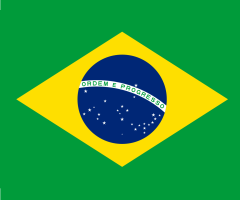
At the national level, Brazil is developing national policies focused on leveraging the potential of emerging digital technologies [in particular the Internet of Things (IoT) and artificial intelligence (AI)] in enabling sustainable development and increased global competitiveness. At the international level, the country is contributing to the work of various policy, regulatory, and standardisation processes.
ARTIFICIAL INTELLIGENCE
Brazil has recently embarked on a journey to position itself among the world leaders in AI. The Federal Government is working on a national strategy to foster the development and use of AI in the country. To this aim, the Ministry of Science, Technology, Innovation and Communications carried out a public consultation between December 2019 and January 2020, inviting the public to submit comments that would help the government define concrete objectives and priority areas. As a starting point, the ministry indicated the following priority areas: skills for the digital future; workforce; research, development, innovation, and entrepreneurship; AI in the public sector; AI in productive sectors; public safety and security; legislation, regulation, and ethical use; international aspects; and AI governance.
In addition to work on a national strategy, the government is also supporting AI research and development activities. In December 2019, the Ministry of Science, Technology, Innovation and Communications, the São Paulo Research Foundation, and the Brazilian Internet Steering Committee announced that they support the creation of eight new applied research centres in AI, which would benefit from public and private funding for a period of up to 10 years. These centres will conduct research focused on the application of AI in areas such as health, agriculture, industry, smart cities, and cybersecurity.
At the international level, Brazil is contributing to and supporting the work of various intergovernmental organisations and processes in the field of AI. The country has endorsed the OECD Principles on AI and is supporting the United Nations Educational, Scientific and Cultural Organization (UNESCO) in its work in this field, too. The country’s cybersecurity strategy (February 2020) also notes the importance of Brazil contributing to international regulatory and standardisation processes related to AI.
Brazil is actively contributing to the work of the Group of Governmental Experts on lethal autonomous weapons systems (GGE on LAWS). For example, together with Austria and Chile, Brazil has proposed a mandate to negotiate a legally binding instrument to ensure meaningful human control over all weapons systems, including LAWS. (For reference, the contributions of Brazil to the 2019 and 2018 GGEs can be found here and here.)
INTERNET OF THINGS
In 2018, the Brazilian government adopted the Digital Transformation Strategy, dedicated, among others, to enhancing the contribution of digital transformation to Brazil’s global competitiveness and raising Brazil’s ranking in the Global Competitiveness Index. The document identifies smart cities and IoT technologies as one of the key areas which should benefit from priority investments, noting that innovation and development in this field ‒ in particular in the fields of urban mobility, security, and utility smart grids ‒ may increase the country’s global competitiveness.
In line with this strategy, in 2019 the government adopted a National Internet of Things Plan, to foster the implementation of IoT as a sustainable development instrument for Brazilian society, capable of increasing competitiveness, strengthening national production chains, and promoting a higher quality of life. The plan also envisions the increased integration of Brazil in the international IoT ecosystem, through participation in standardisation forums; international co-operation in research, development, and innovation; and the internationalisation of IoT solutions developed in the country. To implement the plan, the Ministry of Science, Technology, Innovation and Communications is or will be coordinating several key projects, such as the establishment of competence centres for enabling technologies in IoT, innovation platforms, and a national observatory for monitoring digital transformation. The implementation of the plan is monitored by the Management and Monitoring Chamber for the Development of Machine-to-Machine and Internet of Things Communication Systems ‒ IoT Chamber, a multistakeholder advisory body created in 2014.
IoT and smart cities security considerations are covered in the Brazilian Cybersecurity Strategy, adopted in February 2020. The document also notes the importance of Brazil contributing to international regulatory and standardisation processes related to IoT security.
IoT applications are also present in the Brazilian defence and military sector, in particular in the form of unmanned aerial vehicles (UAVs). For example, FT Sistemas, in co-operation with the Military Engineering Institute and the Army Technology Centre of the Brazilian Army, has developed Horus FT-100, a small UAV that can be used in intelligence, surveillance, and reconnaissance activities, among others. In 2014, the Ministry of Defence approved Horus FT-100 as a strategic defence product.
ARTIFICIAL INTELLIGENCE
- Develops and implements policies aimed at positioning Brazil among the world leaders in AI.
- On LAWS, Brazil advocates for a legally binding international instrument to ensure meaningful human control over all weapons systems, including LAWS. The country is in favour of a ban on completely autonomous weapon systems, i.e., those that operate without human control.
INTERNET OF THINGS
- Works to leverage the potential of IoT and smart city solutions to increase national security and the country’s global competitiveness.